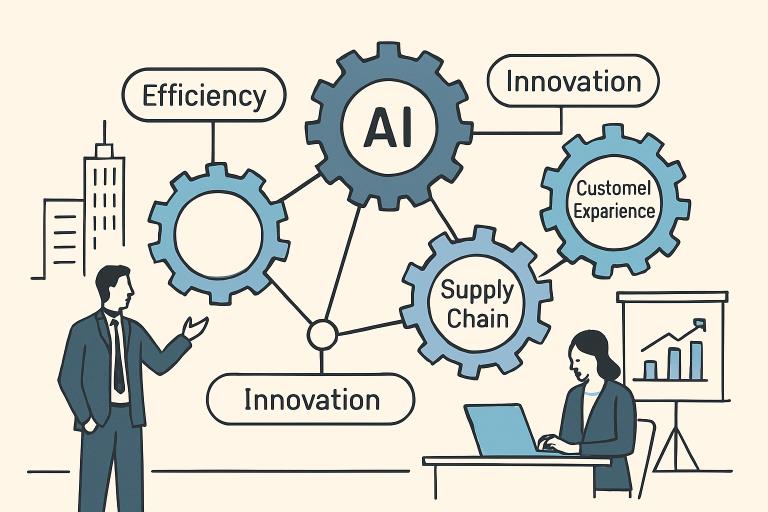Now Reading: How Enterprise AI is Shaping Business Operations
-
01
How Enterprise AI is Shaping Business Operations
How Enterprise AI is Shaping Business Operations

Artificial Intelligence (AI) has evolved from a futuristic aspiration to a fundamental driver of transformation across industries. As businesses adopt digital-first strategies, AI is at the forefront, sparking operational change, new efficiencies, and intense competition. Today’s enterprise AI companies are enabling organizations to automate labor-intensive processes, unlock deeper analytical insights, and reimagine the very foundations of their operations.
Rather than remaining a niche technology, enterprise AI is quickly becoming an indispensable asset for any organization serious about innovation and sustainable growth. Companies are leveraging AI not only to improve performance but also to revolutionize the creation, delivery, and personalization of products and services at scale.
AI’s impact is particularly profound in sectors requiring agility, precision, and rapid decision-making. From manufacturing automation to advanced financial analytics, the possibilities seem limitless—yet many businesses are still learning how best to navigate this powerful technology as it reshapes the competitive landscape.
As adoption accelerates, business leaders and IT professionals must not only understand AI’s transformative potential but also be aware of its current challenges and future trajectory. This ensures that organizations are positioned to maximize value while minimizing disruption as they move towards AI-powered operations.
Enhancing Operational Efficiency
One of AI’s most impactful contributions to enterprise operations lies in workflow automation. By delegating repetitive and time-consuming activities—such as data entry, routine financial reconciliations, and administrative scheduling—to intelligent software, businesses are freeing up human talent for more value-driven, strategic tasks. Recent research indicates that adopting AI can result in a 42% reduction in processing times and a 35% decrease in operating costs, leading to significant bottom-line improvements.
Beyond simple automation, AI-driven systems improve accuracy and minimize compliance risks. AI tools detect anomalies in real time, reducing errors and alerting teams to potential issues before they escalate. As these solutions continue to advance, operational workflows become more agile, efficient, and transparent—vital advantages in dynamic markets.
Driving Innovation and Competitiveness
Innovation is the lifeblood of thriving enterprises. AI enables organizations to outpace competitors by empowering the rapid development of new products and services. Through advanced analytics, companies can uncover subtle market trends, predict customer needs, and develop targeted offerings more quickly and cost-effectively than traditional R&D pathways allow.
A 2025 global report found that nearly 79% of executives have implemented AI in at least one department, reflecting growing recognition of its potential to drive long-term competitive edge. Early adopters can identify and capture new revenue streams, respond quickly to disruption, and capitalize on previously hidden market opportunities.
Improving Customer Experience
AI-powered personalization is quickly becoming the new standard for customer experience in both B2B and B2C environments. Virtual assistants and AI-driven chatbots now deliver 24/7 service, resolving queries instantly and at scale. Moreover, advanced machine learning algorithms analyze user behavior and preferences, providing highly personalized recommendations that enhance customer satisfaction, loyalty, and lifetime value.
This AI-driven personalization doesn’t just support customers—it drives measurable business outcomes. Companies that have integrated AI into their customer engagement processes consistently report higher Net Promoter Scores (NPS) and improved customer retention rates compared to their non-AI-enabled competitors.
Strengthening Supply Chain Resilience
Complex global supply chains depend on accurate forecasting and proactive risk management. AI offers unparalleled predictive power by sifting through massive data sets to identify patterns that humans might overlook. This enables businesses to anticipate shifts in demand, mitigate or avoid disruptions, and optimize logistics decisions in real time.
According to recent industry analyses, organizations that modernize their supply chain management with AI now enjoy greater agility, sustainability, and adaptability in response to both predictable and unforeseen challenges. AI-driven insights are crucial for maintaining continuity and meeting rapidly evolving consumer expectations.
Facilitating Data-Driven Decision Making
Data is one of the most valuable assets in the modern enterprise, but its actual value is only realized when it is converted into actionable insights. AI’s ability to rapidly process vast, complex datasets and extract meaningful patterns enables organizations to make smarter, evidence-based decisions faster than ever before.
With AI-driven predictive analytics, companies can anticipate future trends, optimize resource allocation, and reduce risk exposure. This data-centric approach fundamentally enhances strategy, planning, and operational execution at every level of business, from the C-suite to the front lines.
Challenges in Adopting Enterprise AI
Despite its attractive benefits, the journey to full AI adoption is not without significant obstacles. Implementing AI systems often requires substantial financial investment in both technology and skilled talent. There are also concerns about the impacts on the workforce, such as job displacement and evolving skill requirements, which must be addressed through reskilling and upskilling programs.
Ethical considerations, including data privacy, algorithmic bias, and transparency, present further challenges. To realize AI’s full potential, organizations must develop robust governance models and embed ethical standards throughout the AI lifecycle.
Future Trends in Enterprise AI
Continued advancements in autonomy and integration will define the future landscape of enterprise AI. The rise of agentic AI—systems capable of acting independently with minimal human intervention—will unlock new efficiency ceilings and transform operational strategies. Moreover, merging AI with complementary technologies, such as the Internet of Things (IoT) and edge computing, will deliver unprecedented agility, scalability, and responsiveness.
Successful businesses will be those that can continually adapt to AI’s evolving role—innovating new use cases, reimagining business models, and meeting changing regulatory and societal expectations head-on.
Conclusion
Enterprise AI is driving a new wave of transformation, empowering organizations to streamline operations, enhance decision-making, and deliver exceptional customer experiences. By automating complex processes and uncovering data-driven insights, businesses can strengthen resilience and sustain long-term growth. As AI capabilities advance, strategic investment becomes crucial to staying ahead in a landscape defined by rapid change and technological evolution. Companies that embrace innovation, adapt to emerging tools, and skillfully manage implementation challenges will not only improve efficiency but also redefine industry standards, positioning themselves as agile leaders in a future where intelligence and adaptability are key determinants of success.





















